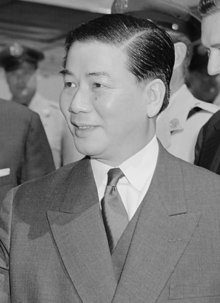

President of the Republic of Vietnam
3 January 1901 Quảng Bình, French Indochina
2 November 1963(1963-11-02) (62) Saigon, South Vietnam
26 October 1955 – 1 November 1963
20th-century President of the Republic of Vietnam In this Vietnamese name, the surname is Ngô, but is often simplified to Ngo in English-language text. In accordance with Vietnamese custom, this person should be referred to by the given name, Diệm. Ngô Đình DiệmDiem in 19571st President of the Republic of VietnamIn office 26 October 1955 – 1 November 1963Preceded by Position established Bảo Đại as Chief of the State of VietnamSucceeded by Dương Văn Minh (as Chairman of the Military Revolutionary Council)6th Prime Minister of the State of VietnamIn office 26 June 1954 – 26 October 1955Preceded by Prince Bửu LộcSucceeded by Nguyễn Ngọc Thơ (as Prime Minister in 1963) Personal detailsBorn(1901-01-03 ) 3 January 1901 Quảng Bình, French IndochinaDied2 November 1963(1963-11-02) (aged 62) Saigon, South VietnamCause of deathAssassination (gunshot wounds)Resting placeMạc Đĩnh Chi Cemetery (until 1983) Lái Thiêu CemeteryPolitical partyCần LaoOther political affiliationsDai Viet Renaissance SocietyRelationsNgô Đình Khôi (brother) Ngô Đình Thục (brother) Ngô Đình Nhu (brother) Ngô Đình Cẩn (brother) Ngô Đình Luyện (brother)ParentsNgô Đình Khả (father)EducationSchool of Public Administration and Law -Hanoi Michigan UniversitySignatureMilitary serviceAllegiance South VietnamBattles/warsVietnam WarVietnamese alphabetNgô Đình Diệm Chữ Hán吳廷琰 Ngô Đình Diệm (/d j ɛ m / or /z iː m / ; Vietnamese: ( listen ) ; 3 January 1901 – 2 November 1963) was a Vietnamese politician. He was the final prime minister of the State of Vietnam (1954–55), and then served as President of South Vietnam (Republic of Vietnam) from 1955 until he was captured and assassinated during the 1963 military coup. Diệm was born into a prominent Catholic family, the son of a high-ranking civil servant, Ngô Đình Khả. He was educated at French-speaking schools and considered following his brother Ngô Đình Thục into the priesthood, but eventually chose to pursue a civil-service career. He progressed rapidly in the court of Emperor Bảo Đại, becoming governor of Bình Thuận Province in 1929 and interior minister in 1933. However, he resigned the latter position after three months and publicly denounced the emperor as a tool of France. Diệm came to support Vietnamese nationalism, promoting an anti-communist and anti-colonialist "third way" opposed to both Bảo Đại and communist leader Hồ Chí Minh. He established the Can Lao Party to support his political doctrine of Person Dignity Theory. After several years in exile, Diệm returned home in July 1954 and was appointed prime minister by Bảo Đại, the head of the Western-backed State of Vietnam. The Geneva Accords were signed soon after he took office, formally partitioning Vietnam along the 17th parallel. Diệm soon consolidated power in South Vietnam, aided by his brother Ngô Đình Nhu. After a rigged referendum in 1955, he proclaimed the creation of the Republic of Vietnam, with himself as president. His government was supported by other anti-communist countries, most notably the United States. Diệm pursued a series of nation-building schemes, emphasising industrial and rural development. From 1957, he was faced with a communist insurgency backed by North Vietnam, eventually formally organized under the banner of the Việt Cộng. He was subject to a number of assassination and coup attempts, and in 1962 established the Strategic Hamlet Program as the cornerstone of his counterinsurgency effort. Diệm's favoritism towards Catholics and persecution of South Vietnam's Buddhist majority led to the "Buddhist crisis" of 1963. The violence damaged relations with the United States and other previously sympathetic countries, and his regime lost favour with the leadership of the Army of the Republic of Vietnam. On 1 November 1963, the country's leading generals launched a coup d'état with assistance from the CIA. He and his younger brother Nhu initially escaped, but were recaptured the following day and assassinated on the orders of Dương Văn Minh, who succeeded him as president. Diệm has been a controversial historical figure in historiography on the Vietnam War. Some historians have considered him a tool of the United States, while others portrayed him as an avatar of Vietnamese tradition. At the time of his assassination, he was widely considered to be a corrupt dictator.

We use cookies
We use cookies and other tracking technologies to improve your browsing experience on our website, to show you personalized content and targeted ads, to analyze our website traffic, and to understand where our visitors are coming from. Privacy Policy.